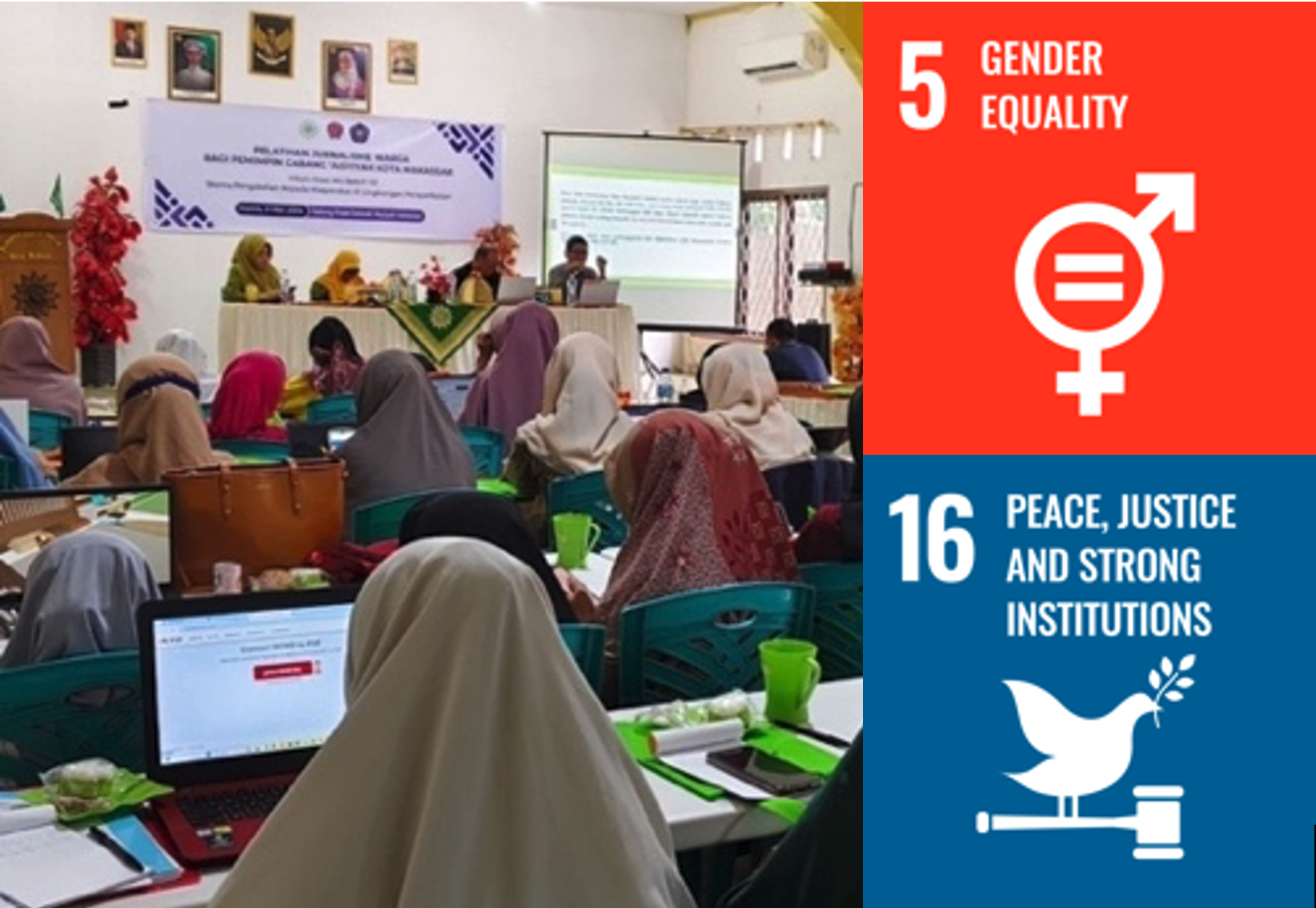Main Article Content
Abstract
One form of modern journalism is citizen journalism, where non-professional individuals can play an active role in the information production process. 'Aisyiyah, as a religious organization active in women's empowerment, encourages its members to contribute to citizen journalism to disseminate progressive Islamic values. The purpose of this community service (PkM) is to enhance the skills of 'Aisyiyah cadres in writing news and captions for news portals and social media. The method used in this service is an audience-centered method, consisting of four stages: partner needs identification, training, mentoring, and evaluation. The training covers basic journalism materials, including journalistic introduction, journalistic ethics, laws and regulations, coverage techniques, information gathering, news writing (5W+1H), photography, and videography using mobile phone cameras. The results of the activity indicate that the participants' understanding of basic journalism increased by 75%, but some participants still require further mentoring.
Keywords
Article Details

This work is licensed under a Creative Commons Attribution-NonCommercial 4.0 International License.
References
- Adryamarthanino, V., & Nailufar, N. N. (2023). Aisyiyah: Latar Belakang, Peran, dan Program.
- Aguirre, M. J. (2021). Ethical levels as a guarantee of quality journalism. Ramon Llull Journal of Applied Ethics, 11(11), 179–207.
- Albarado, S. (2024). Citizen Journalism.
- Alhindi, T., Muresan, S., & Preoţiuc-Pietro, D. (2020). Fact vs. Opinion: the Role of Argumentation Features in News Classification. COLING 2020 - 28th International Conference on Computational Linguistics, Proceedings of the Conference, 6139–6149.
- Bhatia, S., Chaudhary, P., & Dey, N. (2020). Introduction to Opinion Mining. In SpringerBriefs in Applied Sciences and Technology (pp. 1–22). https://doi.org/10.1007/978-981-15-5043-0_1
- Bonita, R. E., Adams, S., & Whellan, D. J. (2011). Reporting of Clinical Trials: Publication, Authorship, and Trial Registration. Heart Failure Clinics, 7(4), 561–567. https://doi.org/10.1016/j.hfc.2011.06.009
- Campbell, V. (2014). Theorizing Citizenship in Citizen Journalism. Digital Journalism, 3(5), 704–719. https://doi.org/10.1080/21670811.2014.937150
- Ceolin, D., & Primiero, G. (2019). A granular approach to source trustworthiness for negative trust assessment. IFIP Advances in Information and Communication Technology, 563 IFIP, 108–121. https://doi.org/10.1007/978-3-030-33716-2_9
- Chikowore, N. R. (2023). Observation as Data Collection. In The Handbook of Teaching Qualitative and Mixed Research Methods: a Step-by-Step Guide for Instructors (pp. 80–83). https://doi.org/10.4324/9781003213277-21
- Djamal, M. F. (2022). Workshop Etika Jurnalisme Warga di Era Digital Bagi Pelajar SMA dan Mahasiswa. Jurnal Pustaka Dianmas, 2(2). https://doi.org/10.32509/dianmas.v2i2.2501
- Dunn, M. W., Tudor, D., Scattergood, C., & Closson, S. (2010). Ask, Reflect , Text A narrative Story-Writing Strategy. Childhood Education, 87(2), 98–105. https://doi.org/10.1080/00094056.2011.10521453
- Eddyono, A. S., HT, F., & Irawanto, B. (2019). Menyoroti Jurnalisme Warga: Lintasan Sejarah, Konflik Kepentingan, dan Keterkaitannya dengan Jurnalisme Profesional. KJ: Kajian Jurnalisme, 3(1). https://doi.org/10.24198/jkj.v3i1.21762
- Emans, B. (2019). Interviewing: Theory, techniques and training. In Interviewing: Theory, techniques and training. https://doi.org/10.4324/9781003021698
- Fisher, C. (2016). The disclosure disconnect: Ideals of transparency and editorial reality. Australian Journalism Review, 38(2), 129–142.
- Galanis, P. (2018). Methods of data collection in qualitative research. Archives of Hellenic Medicine, 35(2), 268–277.
- Heinderyckx, F. (2021). Beyond the News and Opinion Dichotomy. In Handbook of Global Media Ethics (pp. 137–156). Springer International Publishing. https://doi.org/10.1007/978-3-319-32103-5_9
- Huberts, L. (2014). Placing Integrity of Governance in Context. In Governance and Public Management (pp. 198–229). https://doi.org/10.1057/9781137380814_9
- Kurnia, N. (2022). Jagat Komunikasi Kontemporer: Ranah, Riset dan Realitas. In M. Suthan & L. M. Sadasari (Eds.), Memahami Berita dan Kekacauan Informasi: Urgensi Literasi Berita untuk Pengajaran Media dan Jurnalisme. UGM Digital Press.
- Lobo, A. N. (2008). Proses pendampingan wanita pekerja seks sebagai upaya pencegahan HIV/AIDS oleh Perkumpulan Keluarga Berencana Indonesia (PKBI) Papua di Lokalisasi Tanjung Elmo Sentani.
- Norambuena, B. K., Farina, K. R., Horning, M., & Mitra, T. (2023). Watching the Watchdogs: Using Transparency Cues to Help News Audiences Assess Information Quality. Media and Communication, 11(4). https://doi.org/10.17645/mac.v11i4.7018
- Nuri, E., & Ratih, M. (2023). Mengenal Lebih Jauh Citizen Journalism, Jenis, Kelebihan, dan Kekurangannya.
- Patráš, V. (2021). The Pragma-Stylistic Profile and the Purpose of Headlines in Alternative Internet Journalism. Slavia Meridionalis, 21. https://doi.org/10.11649/sm.2427
- Pratiwi, T. A. (2010). Pemahaman Etika Jurnalistik Oleh Citizen Journalism Di Media Online.
- Peraturan Perundang-undangan (UU) Nomor 40 Tahun 1999 tentang Pers, (1999).
- Ramírez-Lozano, J. P., & Rojas-Valdez, K. (2025). Responsible Journalism Network: Impacts and Performance of a University Social Responsibility Program. Doxa Comunicacion, 2025(40), 531–555. https://doi.org/10.31921/doxacom.n40a2740
- Regmi, S., & Bal, B. K. (2015). What Make Facts Stand Out from Opinions? Distinguishing Facts from Opinions in News Media. In Communications in Computer and Information Science (pp. 655–662). https://doi.org/10.1007/978-3-319-23766-4_51
- Shapiro, I. (2014). Why democracies need a Functional Definition of Journalism now more than ever. Journalism Studies, 15(5), 555–565. https://doi.org/10.1080/1461670X.2014.882483
- Syamsiyatun, S. (2022). Perempuan sebagai Jurnalis Mewujudkan Perempuan Berkemajuan. Suara ’Aisyiyah.
- Taboada, M. (2025). Reported speech and gender in the news: Who is quoted, how are they quoted, and why it matters. Discourse & Communication, 19(1), 93–113. https://doi.org/10.1177/17504813241281713
- Talavira, N., Potapenko, S., & Mishchenko, T. (2024). News reporting of public speeches in English on-line media: a constructional perspective. Studies About Languages, 44, 38–52. https://doi.org/10.5755/j01.sal.1.44.34866
- van Antwerpen, N., & Fielding, V. (2023). Constructive Journalism: Techniques for Improving the Practice of Objectivity. Journal of Media Ethics, 38(3), 176–190. https://doi.org/10.1080/23736992.2023.2228313
- Vuori, T. O. (2017). An open-ended interview approach for studying cognition and emotion in organizations. In Methodological Challenges and Advances in Managerial and Organizational Cognition (Vol. 2, pp. 59–71). https://doi.org/10.1108/S2397-52102017003
- Zhang, X., Pan, Y., & Zhang, M. (2014). Superstructure Analysis in News Stories-A Contrastive Study of Superstructure in VOA, BBC, and NPR News. Asian Social Science, 10(22), 199–209. https://doi.org/10.5539/ass.v10n22p199

